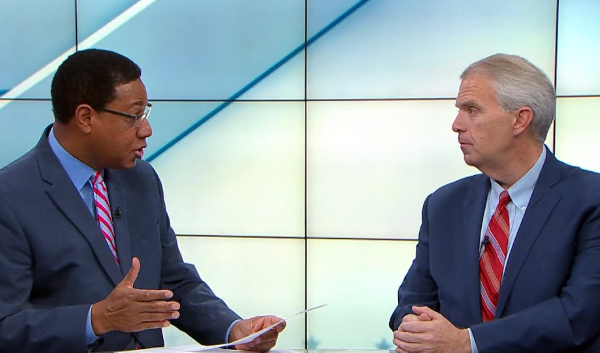Bruce Moore is the News Director at WREG-TV in Memphis, Tennessee — a Nexstar station. He says the job of a news anchor is evolving and those who want to take on that role need to have a special skill set.
Remarks are lightly edited for clarity.
Q: So many reporters hope to one day become anchors – what advice would you give to someone who has anchoring as a career goal?
A: Anchors have to be exemplary storytellers. They’ve got to be grounded and think well on their feet, and they have to be good listeners. But foremost, you have to be a good journalist. You’ve got to be a good reporter, and you’ve got to have a sense of what’s going on [around you]. Normally, that comes from being in the field, as you’re a reporter in the earlier years. Oftentimes, college students can go to a small market and they can get a job on the weekend anchor desk, and that’s a good thing, but my caution would be to make sure that you are in a role where you can get out in the field and tell stories and learn the craft of journalism. Let me tell you what will happen: you’re on the anchor desk one day, and you’re alone, and something happens out in the world…something really important, and you’ve got a news director like me saying, “Stay on, stretch it out.” So, you’ve got to be able to look at that lens, look at the video, and understand what you’re looking at. You need to know a little about how crime scenes are handled, and you need to know how investigators process things. If you’ve been out in the field, you will be more grounded as an anchor.
Q: What are some skills and attributes that you think local TV anchors have or should have?
A: Again, you’ve got to be able to listen. You’ve got to be somebody who can multitask while everything’s going on around you; you may have a producer talking to you in one ear, and the person who’s talking with you on the TV in the other. You have to have good interview skills and, in general, it is important to look professional if you’re working for a TV station; you can’t be an anchor and be a slob. But to me, that’s almost secondary to being, again, a good journalist, somebody who’s an active storyteller and active listener, somebody who can break things down in an understandable fashion. You’ve also got to be a good writer, and you’ve got to be involved in the scripts that you’re reading.
Q: Do you think that streaming and other technological developments will change the roles of news anchors? How have they already changed it?
A: Streaming has already changed [the role of anchors]. It used to be you’d go out during the day, you’d cover this event, and you’d bring it back, package it up, and put it on TV. (At least, that was my experience when I was coming up through the ranks.) Now, the event is flowing in through all your digital platforms. And you may or may not have an anchor helping to analyze and present it to the digital audience. It’s instant. And as a newsroom, we have to think about, okay, what do we need to do instantly? And then, how do we carve that up for our newscasts? What do we do on our digital platforms in written form? What video elements do we need to use on our website? You also have to think about social media, and if you’re streaming it on your station’s website, or on Facebook. It’s changed a lot of things, and it’s going to keep changing.
Q: Are there other ways that the role of an anchor has changed since you joined the business?
A: Something else that has changed a lot is social media. You’ve got an audience on TV, they know you, and you come into their living rooms and become part of their family. They start watching you on social media, and they want to know who you are. An anchor has to figure out how you build a relationship with those people—what’s appropriate to put out there? How much of your life do you share with these so-called fans? Sometimes, you’re walking a tightrope; you want them to understand you, but you can also share too much. There are people out there who don’t have good intentions, so oversharing can put you in danger. It can be scary, and it’s constantly evolving. What’s good, what’s wise, that can also change with the times.








